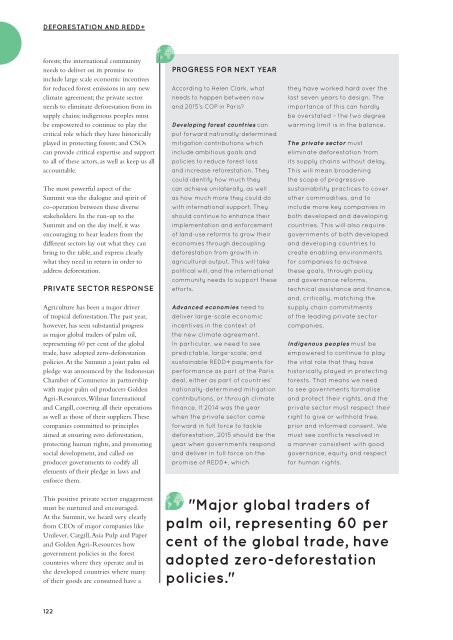Climate Action 2014-2015
Create successful ePaper yourself
Turn your PDF publications into a flip-book with our unique Google optimized e-Paper software.
DEFORESTATION AND REDD+<br />
forests; the international community<br />
needs to deliver on its promise to<br />
include large scale economic incentives<br />
for reduced forest emissions in any new<br />
climate agreement; the private sector<br />
needs to eliminate deforestation from its<br />
supply chains; indigenous peoples must<br />
be empowered to continue to play the<br />
critical role which they have historically<br />
played in protecting forests; and CSOs<br />
can provide critical expertise and support<br />
to all of these actors, as well as keep us all<br />
accountable.<br />
The most powerful aspect of the<br />
Summit was the dialogue and spirit of<br />
co-operation between these diverse<br />
stakeholders. In the run-up to the<br />
Summit and on the day itself, it was<br />
encouraging to hear leaders from the<br />
different sectors lay out what they can<br />
bring to the table, and express clearly<br />
what they need in return in order to<br />
address deforestation.<br />
PRIVATE SECTOR RESPONSE<br />
Agriculture has been a major driver<br />
of tropical deforestation. The past year,<br />
however, has seen substantial progress<br />
as major global traders of palm oil,<br />
representing 60 per cent of the global<br />
trade, have adopted zero-deforestation<br />
policies. At the Summit a joint palm oil<br />
pledge was announced by the Indonesian<br />
Chamber of Commerce in partnership<br />
with major palm oil producers Golden<br />
Agri-Resources, Wilmar International<br />
and Cargill, covering all their operations<br />
as well as those of their suppliers. These<br />
companies committed to principles<br />
aimed at ensuring zero deforestation,<br />
protecting human rights, and promoting<br />
social development, and called on<br />
producer governments to codify all<br />
elements of their pledge in laws and<br />
enforce them.<br />
PROGRESS FOR NEXT YEAR<br />
According to Helen Clark, what<br />
needs to happen between now<br />
and <strong>2015</strong>’s COP in Paris?<br />
Developing forest countries can<br />
put forward nationally-determined<br />
mitigation contributions which<br />
include ambitious goals and<br />
policies to reduce forest loss<br />
and increase reforestation. They<br />
could identify how much they<br />
can achieve unilaterally, as well<br />
as how much more they could do<br />
with international support. They<br />
should continue to enhance their<br />
implementation and enforcement<br />
of land-use reforms to grow their<br />
economies through decoupling<br />
deforestation from growth in<br />
agricultural output. This will take<br />
political will, and the international<br />
community needs to support these<br />
efforts.<br />
Advanced economies need to<br />
deliver large-scale economic<br />
incentives in the context of<br />
the new climate agreement.<br />
In particular, we need to see<br />
predictable, large-scale, and<br />
sustainable REDD+ payments for<br />
performance as part of the Paris<br />
deal, either as part of countries’<br />
nationally-determined mitigation<br />
contributions, or through climate<br />
finance. If <strong>2014</strong> was the year<br />
when the private sector came<br />
forward in full force to tackle<br />
deforestation, <strong>2015</strong> should be the<br />
year when governments respond<br />
and deliver in full force on the<br />
promise of REDD+, which<br />
they have worked hard over the<br />
last seven years to design. The<br />
importance of this can hardly<br />
be overstated – the two degree<br />
warming limit is in the balance.<br />
The private sector must<br />
eliminate deforestation from<br />
its supply chains without delay.<br />
This will mean broadening<br />
the scope of progressive<br />
sustainability practices to cover<br />
other commodities, and to<br />
include more key companies in<br />
both developed and developing<br />
countries. This will also require<br />
governments of both developed<br />
and developing countries to<br />
create enabling environments<br />
for companies to achieve<br />
these goals, through policy<br />
and governance reforms,<br />
technical assistance and finance,<br />
and, critically, matching the<br />
supply chain commitments<br />
of the leading private sector<br />
companies.<br />
Indigenous peoples must be<br />
empowered to continue to play<br />
the vital role that they have<br />
historically played in protecting<br />
forests. That means we need<br />
to see governments formalise<br />
and protect their rights, and the<br />
private sector must respect their<br />
right to give or withhold free,<br />
prior and informed consent. We<br />
must see conflicts resolved in<br />
a manner consistent with good<br />
governance, equity and respect<br />
for human rights.<br />
This positive private sector engagement<br />
must be nurtured and encouraged.<br />
At the Summit, we heard very clearly<br />
from CEOs of major companies like<br />
Unilever, Cargill, Asia Pulp and Paper<br />
and Golden Agri-Resources how<br />
government policies in the forest<br />
countries where they operate and in<br />
the developed countries where many<br />
of their goods are consumed have a<br />
"Major global traders of<br />
palm oil, representing 60 per<br />
cent of the global trade, have<br />
adopted zero-deforestation<br />
policies."<br />
122












